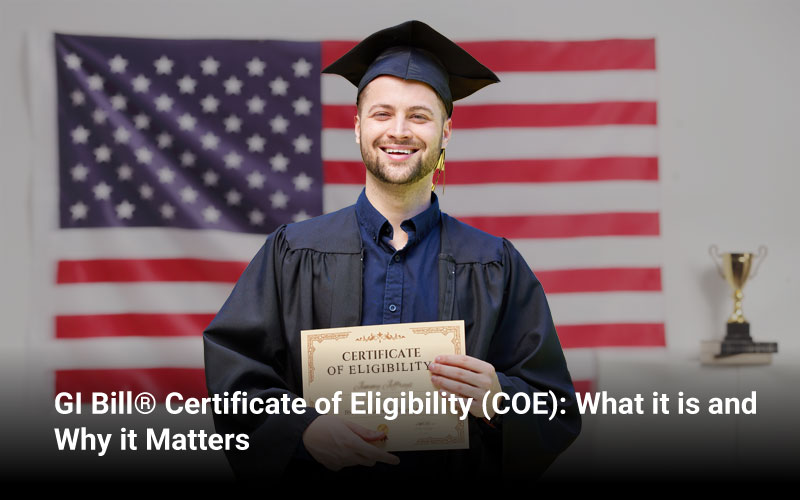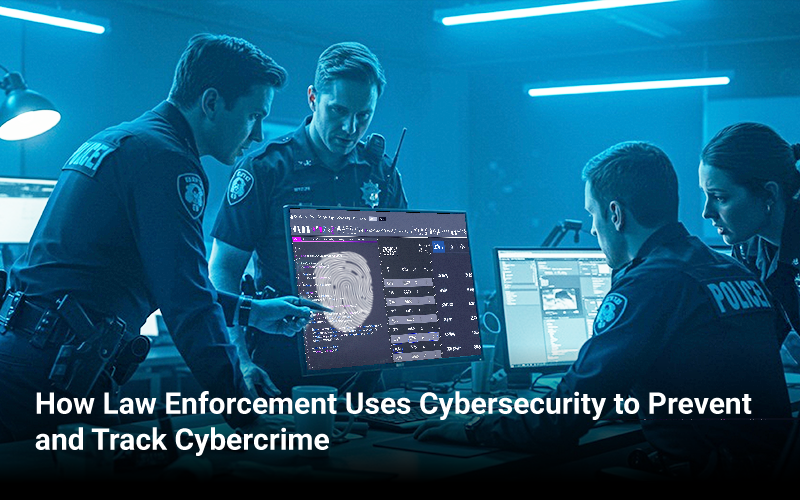If you’re a current or former U.S. Military member, the GI Bill® is one of the most powerful benefits you can earn through your service. Whether you want to pursue a degree, certification courses, or specialized training, the GI Bill® can cover a significant portion, if not all, of your educational costs. But before you can tap into these benefits, there’s one essential document you’ll need: your GI Bill® Certificate of Eligibility (COE). Think of it as the confirmation document that allows you to access the education benefits you’ve rightfully earned.
This article helps you understand what the COE is, why it’s so important, how to get it, and how to avoid common mistakes during the application process. You’ll also discover how the COE can open doors to affordable, high-quality cybersecurity education at EC-Council University, an online institution that’s helping veterans become leaders in one of the fastest-growing industries today.
Introduction to GI Bill® Educational Benefits
Offered by the VA (U.S. Department of Veterans Affairs), the GI Bill® is meant to help service members, veterans, and their families pursue higher education. Over time, it’s evolved to match the needs of modern learners and the changing job market. Depending on your service history, you may qualify under one of several programs:
- Post-9/11 GI Bill® (Chapter 33)
- Montgomery GI Bill® Active Duty (Chapter 30)
- Montgomery GI Bill® Selected Reserve (Chapter 1606)
- Veteran Readiness and Employment (VR&E) (Chapter 31)
- Survivors’ and Dependents’ Educational Assistance (DEA) (Chapter 35)
Each program has unique benefits, but most cover tuition and fees, a monthly housing allowance, and funds for books and supplies. Some even offer relocation or certification exam reimbursement.
Now, while these benefits can make higher education much more affordable, you can’t simply enroll in a university and expect the VA to start paying. To activate your benefits, you’ll first need your Certificate of Eligibility (COE).
What Is the Certificate of Eligibility (COE)?
Your Certificate of Eligibility (COE) is an official letter from the VA confirming that you’re entitled to receive GI Bill® education benefits. In short, the COE specifies:
- The GI Bill® program you qualify for
- How much entitlement (months of benefits) you have left
- The percentage of benefits you’re eligible to receive (100%, 80%, etc.)
- The date your eligibility expires
The COE is your official documentation from the VA that proves your eligibility for GI Bill® education benefits. Schools need it to certify your enrollment and request tuition payments directly from the VA. Without it, your benefits cannot be processed.
How to Acquire Your Certificate of Eligibility (COE)
Thankfully, getting your COE isn’t difficult, as it requires just a few simple steps:
Step 1: Apply for GI Bill® Benefits
If you haven’t already applied for GI Bill® benefits, you’ll need to complete VA Form 22-1990 (Application for Education Benefits). You can do this in one of three ways:
- Online: Visit the VA’s official website at VA.gov/education
- By Mail: Download and mail the completed form to your regional VA processing office.
- In Person: Visit a VA regional office for in-person assistance.
If you’re a dependent or spouse using transferred benefits, you’ll need to fill out VA Form 22-1990e instead.
Step 2: Wait for VA Processing
After submitting your application, the VA typically processes it within 30 days (online applications tend to get processed faster). You’ll receive your Certificate of Eligibility (COE) by mail or digitally (if you’ve opted for electronic correspondence) once your application is approved.
Step 3: Submit Your COE to Your School
Once you receive your COE, submit it to your school’s VA Certifying Official (usually a member of the financial aid department or veterans’ services office). They’ll use the information from your COE to certify your enrollment with the VA, triggering your tuition payments and allowances.
Avoid These Mistakes When Applying for Your Certificate of Eligibility (COE)
Even though the process of acquiring your COE is straightforward, the following common errors can cause delays:
Submitting an Incomplete Application:
Make sure you fill out every section of the VA form, including your service dates, education goals, and school information. Missing details can result in processing delays.
Forgetting to Include Supporting Documents:
Attach a copy of your DD Form 214 (Certificate of Release or Discharge from Active Duty). This document verifies your service and is required for eligibility verification.
Applying for the Wrong GI Bill® Chapter:
If you’re unclear on which GI Bill® chapter you qualify for, consult a VA education counselor or your school’s veterans’ office before applying. Applying under the wrong chapter can cause your request to be denied or delayed.
Not Checking Your VA Mail or Email:
Many veterans miss important updates because they don’t check their VA correspondence. Log in to your VA.gov account regularly to monitor the status of your application.
Waiting Too Long to Apply:
It’s best to begin the COE process at least 60 days before the start date of the educational program/course you want to join. This ensures the school receives your eligibility confirmation in time for tuition certification.
By avoiding these pitfalls, you’ll speed up your approval process and prevent any interruption in your education funding.
The Certificate of Eligibility (COE) Opens the Door to Cybersecurity Education at EC-Council University
Having your COE in hand opens a world of opportunity, especially if you’re looking to build a career in rapidly growing sectors like cybersecurity and digital technology. At EC-Council University (ECCU), your GI Bill® benefits can cover a significant portion of your tuition for cybersecurity and computer science programs like:
ECCU is recognized by the U.S. Department of Veterans Affairs and proudly accepts GI Bill® funding for eligible veterans, active-duty service members, and their dependents. What sets ECCU apart is its veteran-friendly approach. Many ECCU students are former military members transitioning into civilian careers. With a completely online learning format, ECCU allows you to balance education with work and personal commitments.
Furthermore, ECCU’s curriculum is aligned with industry standards and current requirements. In addition to a valuable degree, you’ll also earn globally recognized cybersecurity certifications such as CEH (Certified Ethical Hacker), CND (Certified Network Defender), CHFI (Computer Hacking Forensic Investigator), and more.
For a comprehensive guide to GI Bill® education benefits with EC-Council University, please visit: Gi Bill Educations Benefits
Final Thoughts: Your COE is the First Step Toward a Meaningful Career
As a veteran, you’re trained to plan ahead, follow procedures, and execute missions with precision. Applying for your Certificate of Eligibility (COE) is no different. It’s the first, crucial step in your mission toward higher education and professional success.
With your COE secured, your next step is simple. Find the right institution that understands your educational and career goals, values your service, and helps you turn your experience into expertise.
If cybersecurity excites you, and you’re ready to make a real impact defending digital frontlines, EC-Council University can be your launchpad. Your COE gets you in the door, and ECCU’s programs can help you stride confidently into a career where your skills truly matter. You’ve already proven your dedication through service. Now it’s time to invest in your future. Start your COE application today and take the first step toward earning your degree and advancing your career.
Need personalized guidance?
Disclaimer: EC-Council University is approved by the U.S. Department of Veterans Affairs to accept GI Bill® education benefits but is not endorsed by the VA.







